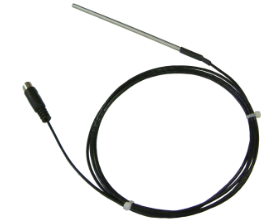
Description:
Platinum resistance thermometers (PRTs) offer excellent accuracy over a wide temperature range (from -200 to +850 °C). The principle of operation is to measure the resistance of a platinum element. The most common type (PT100) has a resistance of 100 ohms at 0 °C and 138.4 ohms at 100 °C. For a PT100 sensor, a 1 °C temperature change will cause a 0.384 ohm change in resistance, so even a small error in measurement of the resistance (for example, the resistance of the wires leading to the sensor) can cause a large error in the measurement of the temperature. For precision work, sensors have four wires- two to carry the sense current, and two to measure the voltage across the sensor element. It is also possible to obtain three-wire sensors, although these operate on the (not necessarily valid) assumption that the resistance of each of the three wires is the same.
- Measurement: surface temperature
- Probe type: SE012
- Temperature range: -50 to +250°C
- Accuracy: ±0.03°C @ 0°C
Manual: Calibration of thermocouples
